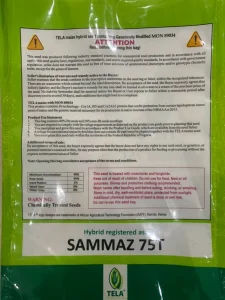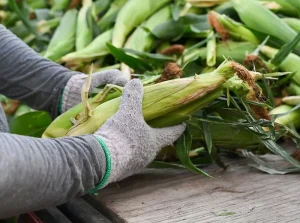NEWS
GMOs Are Disguised Economic Colonisation Tools 2025

GMOs Are Disguised Economic Colonisation Tools – Prof. Amua
Executive Director of the Centre for Food Safety and Agricultural Research (CEFSAR), has issued a stern warning about
the long-term dangers of genetically modified organisms (GMOs) in Nigeria. In a monitored television interview, Prof. Amua described GMOs as “tools of disguised economic colonisation”, engineered to benefit foreign companies while eroding the sovereignty of developing nations like Nigeria.

Misleading Narrative: Can Nigeria Survive on Rural Agriculture?
Prof. Amua responded strongly to comments made by the Director General of the National Biosafety Management Agency (NBMA),
Dr. Yemisi Asagbra, who claimed Nigeria could not survive on rural farming methods alone. Describing her statement as “shameful,” he argued that Nigeria, particularly states like Benue, already produces abundant food without GMO assistance.
“We have oranges, mangoes, vegetables, and tomatoes wasting due to lack of preservation, not lack of productivity,” he said. “To claim we need proprietary GMO seeds from Monsanto, Bayer, or Syngenta is not only misleading but undermines our farmers’ capacity.”
GMOs as Market Tools, Not Scientific Necessity
According to Amua, the introduction of GMOs is more of a market strategy than a scientific solution. “When you tie food security to foreign-owned seeds, you are handing over your food sovereignty,” he warned. He pointed out that GMO seeds do not perform without extensive agronomic support and that good farming practices, which have been abandoned, can still yield excellent results.

Food Insecurity Is a Policy, Not Production, Problem
The professor emphasized that Nigeria’s food insecurity is driven more by post-harvest losses and lack of infrastructure than insufficient food production. He called for investment in food preservation, storage, and distribution instead of rushing into GMO adoption.
“Make Nigerians hungry, and they’ll accept anything,” Amua said. “That’s the principle behind GMO promotion—create dependency, then sell control.”
Institutional Capture and Foreign Control
Amua expressed concern that the pro-GMO narrative is being pushed at an institutional level in Nigeria. He alleged that international companies have a history of bribery and “institutional capture,” influencing key government bodies to promote their agenda.
“These companies are present in our media, research institutions, and now government agencies. It’s worrying. I’m not alleging anything, I’m expressing deep concern,” he said.
Foreign Patents: Local Production, Foreign Ownership
On claims that the GMO seeds are being produced in Nigeria, Amua challenged the assertion, asking: “Under whose patent?” He emphasized that producing seeds locally does not equal ownership. The biotechnology, intellectual property, and long-term control still lie with foreign corporations.

Nigeria Lacks Capacity to Develop Its Own GMOs
According to Amua, Nigeria does not currently have the technical or institutional capacity to independently develop its own GMO technologies. He revealed that sophisticated lab equipment remains unopened and unmanned due to lack of training and funding.
“For 10 years, the National Biotechnology Research and Development Agency has had sealed equipment in Port Harcourt. No trained personnel, no research output. And we want to produce GMOs?” he asked.
Labeling GMOs in Nigeria Is Impractical
Amua dismissed NBMA’s plans to label GMO foods as unrealistic and unworkable in the Nigerian context. He explained that the informal nature of Nigeria’s food economy means that average consumers have no way of identifying whether their food contains GMOs.
“How will a woman frying akara on the street know the source of her beans? Nigerians don’t choose their food—they eat what they find,” he said. He warned that promoting large-scale GMO farming will ultimately sideline smallholder farmers and destroy rural livelihoods.
GMO Foods in IDP Camps: A Dangerous Precedent
One of the most alarming revelations by Amua was the use of GMO grains in Internally Displaced Persons (IDP) camps. He noted that foreign food donations, often genetically modified, are distributed to hungry and vulnerable Nigerians without labeling or informed consent.
“When people are starving, they will eat anything. But does that make it right? That’s how control begins—create dependence, then offer solutions that deepen it,” Amua said.

Call to Action: Restore Food Sovereignty
Amua concluded with a call to action for Nigerian policymakers, academics, and civil society to reject GMO dependency and invest in homegrown agricultural development.
“We have the land, we have the youth. What we lack is the political will to believe in ourselves. Let’s fix our infrastructure, preserve our harvests, and train our farmers. We do not need GMOs to survive. What we need is vision and courage.”

